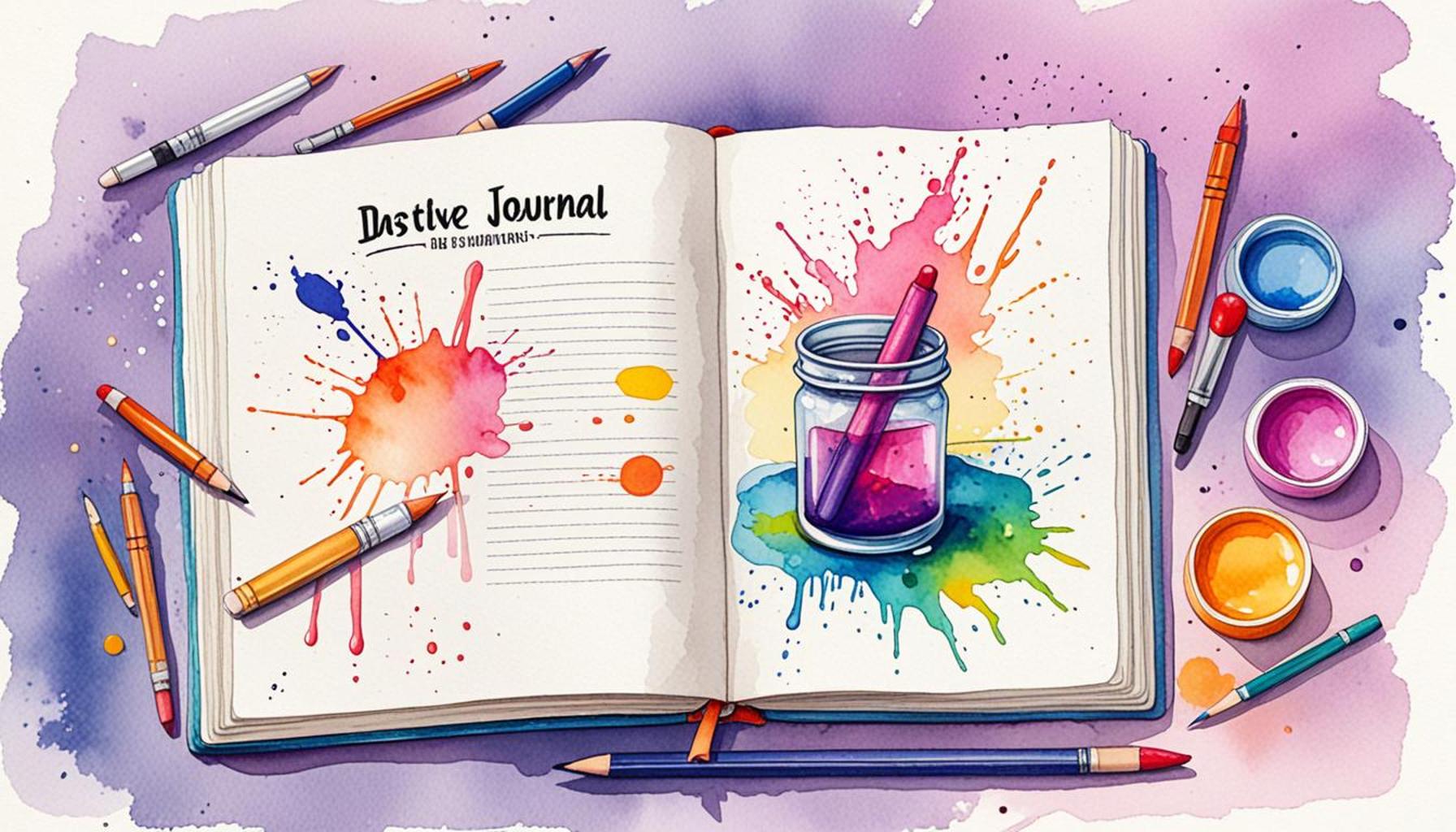The Importance of Reflective Journaling in Transforming Mistakes into Learning Opportunities

Understanding the Role of Reflective Journaling
In the journey of personal and professional growth, mistakes often act as stepping stones rather than stumbling blocks. Embracing these missteps through reflective journaling can significantly influence the learning process. This practice encourages individuals to dig deeper into experiences, fostering a cycle of self-improvement that ultimately leads to more enriching lives.
What is Reflective Journaling?
Reflective journaling involves jotting down thoughts, emotions, and insights about experiences, particularly failures and setbacks. By engaging in this method, individuals can transfer vague feelings into tangible reflections and thus achieve clarity. This approach allows for:
- Critical thinking: Analyzing situations helps uncover valuable lessons that can be elusive at first glance. For example, a student who fails an exam might explore what specific study habits led to that outcome, allowing for better preparation next time.
- Emotional clarity: Writing about feelings can reduce stress and provide perspective. In Nigeria, where societal pressures can be overwhelming, reflective journaling can serve as a safe space to process emotions related to both personal and communal expectations.
- Goal setting: Learning from mistakes promotes the setting of realistic future goals. By assessing obstacles faced and understanding personal responses, individuals are better equipped to set achievable milestones.
Why is it Essential?
Reflective journaling offers essential benefits, especially within the rich cultural context of Nigeria, where narratives surrounding success and failure are often laden with expectations and norms. These include:
- Promotes resilience: Understanding mistakes leads to resilience in challenging circumstances. For instance, entrepreneurs in Nigeria often face numerous obstacles; reflective journaling allows them to document failures, analyze why things did not go as planned, and foster the strength needed to persist.
- Encourages open dialogue: Sharing reflections can inspire discussions about overcoming setbacks. This aspect is particularly relevant in communal settings where people can benefit from shared experiences, learning together, and supporting one another in their journeys.
- Enhances creativity: Exploring failures can spark innovative ideas and solutions. An artist may reflect on a poorly received piece, leading to new perspectives and ultimately inspiring a breakthrough in their work.
By integrating reflective journaling into your routine, you don’t just note down events; you transform your mistakes into powerful learning opportunities. This practice cultivates a mindset that views challenges as part of a broader learning narrative, enabling individuals to shape a brighter future. Encourage this habit in educational settings or workplaces by setting aside regular times for reflection, creating a culture where learning from experiences is celebrated rather than shunned.
RECOMMENDED: Check out this similar article

Navigating the Path from Mistakes to Mastery
Reflective journaling serves as a powerful tool that enables individuals to navigate the often tumultuous journey from mistakes to mastery. In a landscape where cultural nuances shape our perspectives on success and failure, understanding the significance of this practice can lead to profound transformations. In Nigeria, where communal pride is paramount, the fear of failing can be paralyzing. However, by embracing failure as a stepping stone rather than a roadblock, individuals can foster a mindset that thrives on growth.
The Mechanism of Reflective Journaling
At its core, reflective journaling is a structured method of processing experiences. This practice invites individuals to return to their thoughts and feelings with intention, creating a personalized roadmap for learning. The mechanics of reflective journaling can be broken down into several key components:
- Descriptive Reflection: Individuals begin by detailing specific events or experiences, focusing on the what, where, and when. For example, a young professional might recount a recent presentation where they struggled to engage their audience.
- Analytical Reflection: After describing the event, one must explore the underlying factors that contributed to the experience. This could include examining personal preparation, understanding the audience’s expectations, or identifying external pressures.
- Emotional Response: Capturing the emotional essence of an experience is crucial. How did the individual feel during the presentation? Were they anxious, confident, or overwhelmed? These reflections connect the emotional and cognitive aspects of learning.
- Future Action: Finally, a pivotal aspect of reflective journaling is setting actionable steps to address the mistakes. For instance, the individual could commit to practicing public speaking more frequently or seek feedback from peers to enhance their skills.
The Cultural Context in Nigeria
Understanding the societal context is essential when promoting reflective journaling. In Nigeria, where family, tradition, and communal values intertwine, taking the time to reflect can be both liberating and daunting. Mistakes are often viewed through a communal lens, leading to shared disappointment but also shared wisdom. By documenting their thoughts, individuals can reclaim their narratives and transform collective societal pressures into opportunities for personal growth.
As more people navigate the challenges of academia, entrepreneurship, and personal development, reflective journaling emerges as a vital practice that opens the door to effective learning. It empowers individuals not only to confront failures but also to leverage them for future successes. A culture that embraces reflective journaling promotes an environment where learning from mistakes becomes a cherished value, fostering resilience and innovation across various spheres of life.
Reflective journaling plays a pivotal role in personal and professional growth, especially when it comes to transforming mistakes into valuable learning opportunities. One of the exceptional aspects of reflective journaling is its capacity to promote self-awareness. By regularly documenting thoughts and experiences, individuals can identify patterns in their decision-making and behavior. This self-reflection fosters a deeper understanding of oneself, enabling people to recognize not only their errors but also their strengths.Moreover, reflective journaling encourages a growth mindset. When individuals confront challenges and document their responses, they begin to see mistakes not as failures but as stepping stones toward improvement. This shift in perspective is crucial; it empowers individuals to take risks and experiment, knowing that each misstep carries the potential for learning.Research has shown that reflection enhances retention and comprehension. When we write about experiences, we process information more effectively, leading to more profound insights and lasting change. Journaling also provides a safe space for exploring emotions connected to mistakes, reducing feelings of fear and anxiety. This emotional processing is essential for moving forward, allowing individuals to approach future challenges with resilience and optimism.Reflective journaling can be further enhanced by integrating prompts that guide individuals in their writing. Questions such as “What did I learn from this situation?” or “How can I apply this knowledge in the future?” can stimulate critical thinking and reflection. Over time, this practice not only improves personal insight but also contributes to overall emotional intelligence.In summary, reflective journaling is a powerful tool that not only aids in processing mistakes but also helps individuals harness those experiences for future success. By cultivating self-awareness and a growth mindset, journaling transforms setbacks into opportunities for learning and development. For those looking to maximize their potential, incorporating reflective journaling into their routine can be a game-changer in their journey of personal growth.
CHECK OUT: Click here to explore more
Harnessing the Power of Reflection for Continuous Improvement
Reflective journaling is not merely a tool for processing past events; it embodies a philosophy that encourages continuous improvement. As individuals pen down their experiences, they cultivate a habit of self-assessment and introspection. This process is particularly crucial in Nigeria, where the journey to success is often intertwined with the lessons learned from failures. Insightful reflections can lead to significant breakthroughs, allowing individuals to pivot and adjust their strategies effectively.
Building Emotional Intelligence
One pivotal benefit of reflective journaling is the enhancement of emotional intelligence (EQ). Individuals who actively engage in this practice become more attuned to their emotions and the emotions of others. For instance, a student who reflects on a poor grade may recognize feelings of frustration or anxiety that cloud their judgment. By analyzing these emotions, they can better navigate their responses in future academic endeavors. This heightened sense of emotional awareness not only helps in managing personal challenges but also fosters stronger interpersonal relationships, essential in a diverse nation such as Nigeria.
Creating a Feedback Loop
Another aspect of reflective journaling is its ability to create a continuous feedback loop between experiences and insights. As individuals document their thoughts, they begin to identify recurring themes in their mistakes. For example, an entrepreneur might notice a pattern of procrastination that leads to missed deadlines. This realization prompts them to implement accountability measures, such as setting regular check-ins with a mentor. By recognizing and addressing these patterns through consistent journaling, one can transform their approach and achieve more successful outcomes.
Fostering a Growth Mindset
The act of reflective journaling cultivates a growth mindset, a term popularized by psychologist Carol Dweck. This mindset is the belief that abilities and intelligence can be developed with effort and persistence. In a society where success is often attributed to innate talent, embracing a growth mindset through journaling can be revolutionary. For instance, when a young professional notes their struggles during a project presentation and reflects on how they can improve their skills, they are actively planting the seeds of growth in their professional journey. This shift in outlook encourages a culture of resilience and adaptability.
An Inclusive Platform for Diverse Voices
In Nigeria’s multicultural tapestry, reflective journaling presents an inclusive platform for diverse voices. It allows individuals from various backgrounds to express their unique experiences and perspectives on mistakes and failures. Sharing these reflections can break down societal stigmas associated with failure. When a student from Lagos shares their journaling journey about overcoming failure in their exams, it can empower others facing similar struggles in different parts of the country. This exchange of experiences creates a community bound by the collective understanding that mistakes serve as invaluable teachers.
By weaving these layers of emotional insight, continuous feedback, and cultural inclusivity into the practice of reflective journaling, individuals not only illuminate their paths to success but also contribute to a broader narrative that embraces learning opportunities in the face of adversity. It is this critical perspective that propels both personal and collective growth, making reflective journaling an indispensable element in transforming mistakes into powerful learning opportunities.
ADDITIONAL INSIGHTS: Expand your understanding here
Conclusion: Embracing Mistakes as Pathways to Growth
In a world that often stigmatizes failure, reflective journaling emerges as a beacon of hope, guiding individuals toward a greater understanding of their experiences. This practice not only helps to transform mistakes into learning opportunities but also fosters a culture that embraces vulnerability and growth. As we have explored, the ability to dissect our errors, understand our emotions, and recognize patterns of behavior is pivotal, especially in the context of Nigeria’s diverse landscape.
By cultivating emotional intelligence, establishing a continuous feedback loop, and fostering a growth mindset, reflective journaling allows individuals to turn setbacks into actionable strategies for improvement. The stories shared through this practice resonate across communities, creating an inclusive narrative that empowers others to confront their challenges head-on. Furthermore, as we exchange tales of resilience, society evolves, making room for a collective understanding of the value embedded within our failures.
Ultimately, embracing the practice of reflective journaling is not just about personal growth; it is about cultivating a generation that sees mistakes as an essential ingredient for success. As more Nigerians adopt this practice, we pave the way for a future where learning from failures is celebrated, thus enriching our cultural tapestry. In this journey toward enriching our lives, let us remember: each page penned in reflection is a step closer to transforming our missteps into the stepping stones of achievement.


